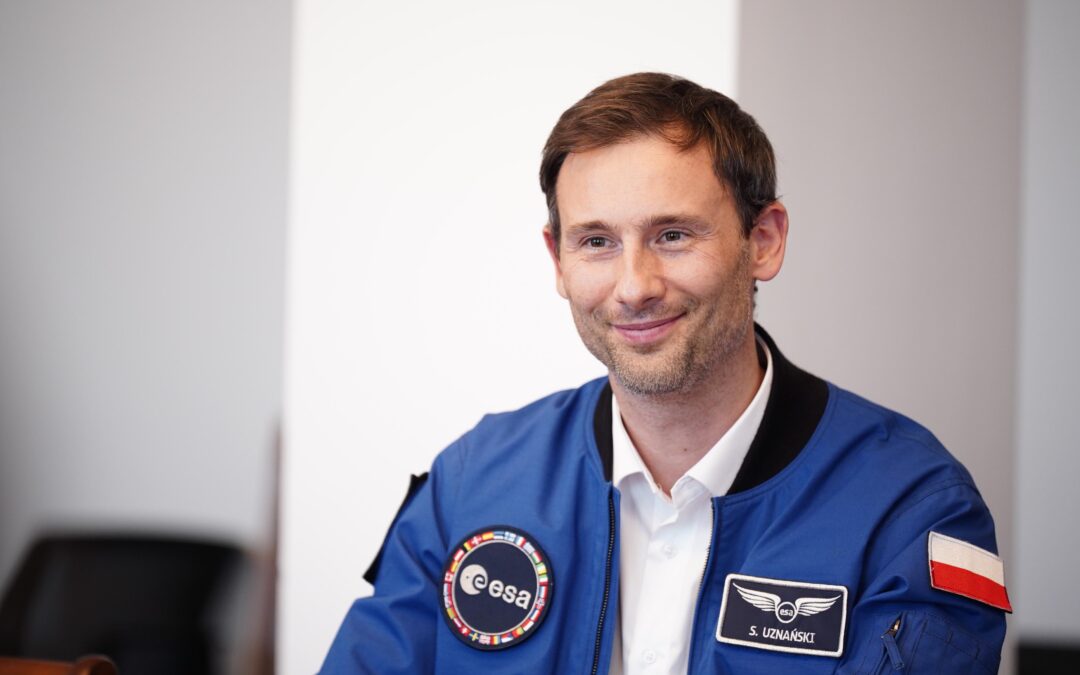Keep our news free from ads and paywalls by making a donation to support our work!

Notes from Poland is run by a small editorial team and is published by an independent, non-profit foundation that is funded through donations from our readers. We cannot do what we do without your support.
The first ever Polish mission to the International Space Station (ISS) will launch in spring 2025, Poland’s space agency, POLSA, has announced. It will see astronaut Sławosz Uznański become only the second Pole to travel to space – and the first in almost 50 years – during his 14-day stay on the ISS.
On Wednesday, POLSA revealed the name of the mission – Ignis, meaning “fire” in Latin – and outlined its key objectives. The project will see Uznański lead 13 experiments relating to technology, biology, medicine and psychology developed by scientists and engineers in Poland.
The endeavour is being financed by the Polish government and supported by the European Space Agency (ESA), which chose Uznański as an astronaut candidate in 2022 and began his training last year.
It will launch – as part of the broader Axiom 4 project – from Cape Canaveral, Florida, aboard a SpaceX Falcon 9 rocket and Dragon capsule. An exact date is not confirmed, but the president of POLSA, Grzegorz Wrochna, noted that it would take place “in the spring of next year, not earlier than April”.
🇵🇱 IGNIS oznacza Ogień.
Symbol nowego początku w lotach kosmicznych. Iskra innowacji.Po 46 latach od ostatniego polskiego załogowego lotu w kosmos wkraczamy w nową erę – z pierwszą polską misją na Międzynarodową Stację Kosmiczną. #IGNIS jest kamieniem milowym dla polskiego… pic.twitter.com/0YEYjYYOgC
— Slawosz Uznanski (@astro_slawosz) December 2, 2024
“This is a significant opportunity for the Polish space sector to build unique competencies and accelerate the commercialisation of space technologies,” said Poland’s development minister, Krzysztof Paszyk.
He revealed that the experiments to be carried out as part of the Polish mission “include studies on the human microbiome, testing innovative materials, and exploring projects in artificial intelligence”.
“This mission is a testament to Poland’s dynamic development in space technology and its value as an ESA partner,” added ESA’s director general Josef Aschbacher. “Sławosz was chosen from 22,000 candidates and has become a brightly shining star since his selection”.
Polish astronaut Sławosz Uznański has completed his first week of training for his mission to the International Space Station. He will be only the second Pole to travel to space.
For more, see our report on his selection last month: https://t.co/GQPjn5VQiQ https://t.co/bOsbAS6Gkq
— Notes from Poland 🇵🇱 (@notesfrompoland) September 8, 2023
Uznański himself said that the upcoming mission “is just the beginning”, reports the Polish Press Agency (PAP). “We are building our technological future. We have our place in space but also much bigger ambitions.”
He revealed that his schedule on the ISS is already planned almost down to the minute. He also noted that his training for the mission is now around 30% complete. Among the aspects he still needs to tackle is training in responding to medical emergencies on board the space station.
The patch of the Polish mission was also presented this week. It features a white and red eagle symbolising Poland’s national emblem and colours. The eagle’s tail forms a flame, echoing the mission’s name, while its wings outline the Eagle’s Path (Orla Perć) trail in the country’s Tatra mountains.
Other elements include the ISS panels, the Suctum constellation (previously known in Polish as Sobieski’s Shield), and a silver line representing the dawn of a new space exploration era.

In 2023, Warsaw increased its contributions to ESA by €295 million for the years 2023-2025, allowing Polish companies to participate in various programmes for the development of technologies, products and services in the field of satellite communications, navigation and Earth observation.
Later that year the country signed an agreement with the European agency to launch its first constellation of satellites in 2027. In 2022, Poland also bought two military satellites and a receiving station from France.
The only previous Pole to travel into space was the late Mirosław Hermaszewski, who was part of a two-man crew aboard the Soviet spaceship Soyuz 30 that flew into orbit on 27 June 1978 and docked at the Salyut 6 orbital space station.

Notes from Poland is run by a small editorial team and published by an independent, non-profit foundation that is funded through donations from our readers. We cannot do what we do without your support.
Main image credit: Ministerstwo Rozwoju i Technologii (under CC BY-NC-ND 3.0 PL)

Alicja Ptak is deputy editor-in-chief of Notes from Poland and a multimedia journalist. She has written for Clean Energy Wire and The Times, and she hosts her own podcast, The Warsaw Wire, on Poland’s economy and energy sector. She previously worked for Reuters.



















